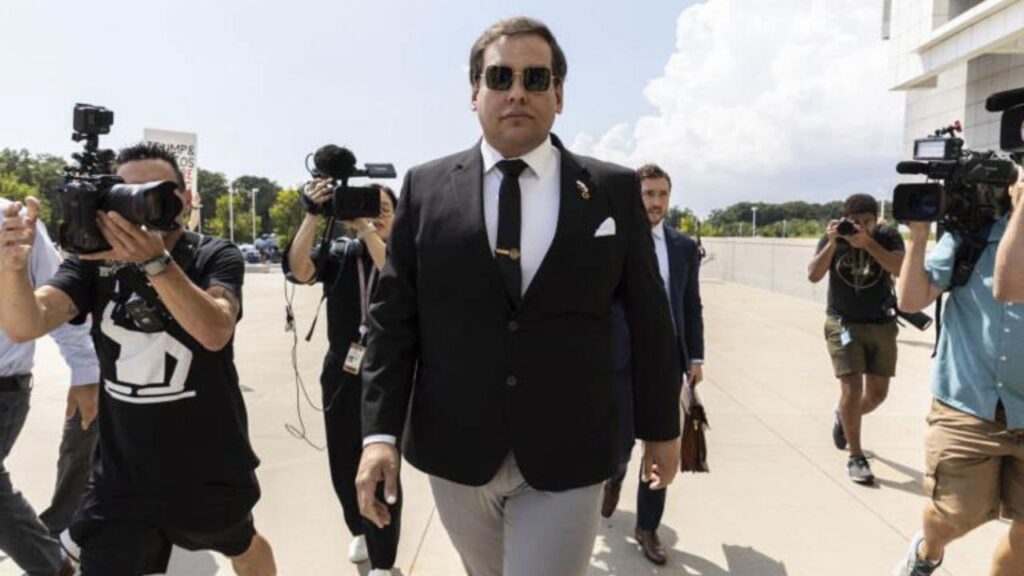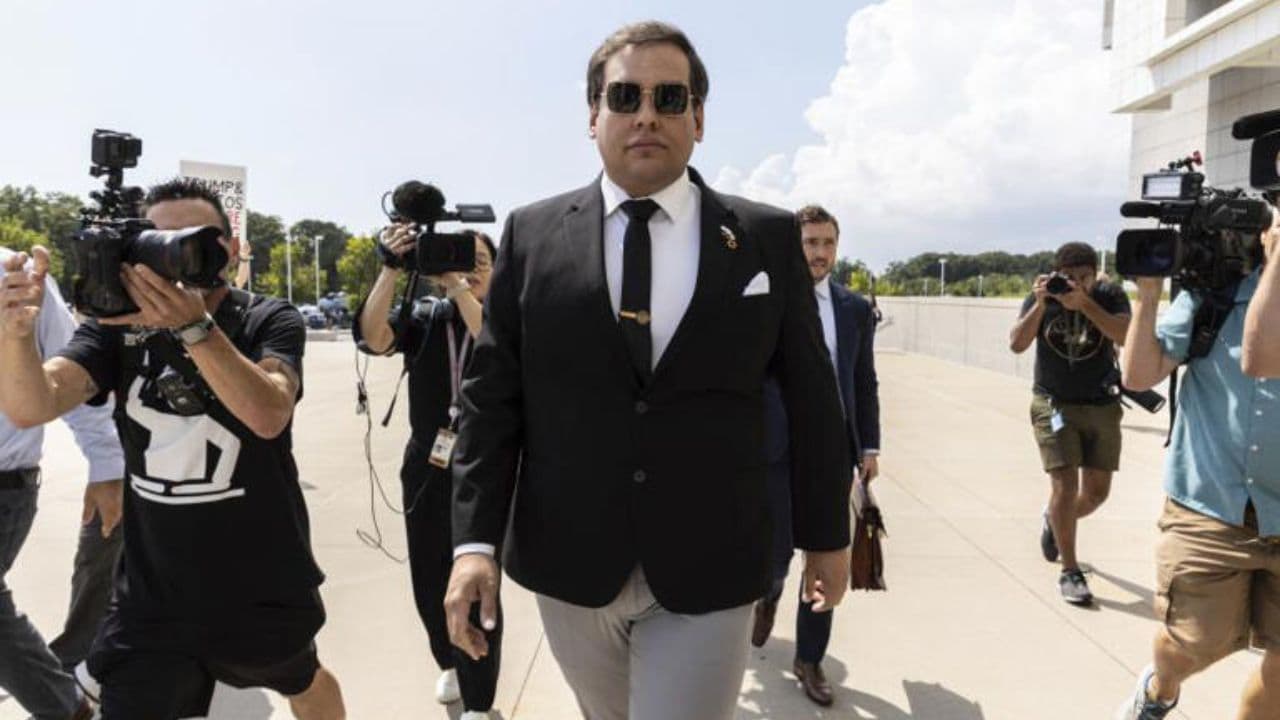George Santos wire fraud, George Santos identity theft, George Santos guilty plea, George Santos political scandal, George Santos expulsion, George Santos sentencing, U.S. politics fraud, political corruption case, George Santos biography, Long Island Congressman fraud
Explore the dramatic rise and fall of former U.S. Representative George Santos, who recently pleaded guilty to wire fraud and identity theft. This article delves into his political career built on lies, his legal battles, and the broader implications for public trust in government. Discover the lessons learned from Santos’ story and the consequences of allowing ambition to overshadow integrity.

Former U.S. Rep. George Santos Pleads Guilty to Wire Fraud and Identity Theft
In a significant development that underscores the importance of integrity in public office, former U.S. Representative George Santos has pleaded guilty to wire fraud and aggravated identity theft. His admission of guilt marks the culmination of a dramatic downfall from a once-promising political career to a convicted felon. Santos’ case is a poignant reminder of the consequences of allowing personal ambition to overshadow ethical conduct, a lesson that reverberates not only through the halls of Congress but also through the broader political landscape.
A Political Career Built on Lies
George Santos, a New York Republican, was elected to Congress in 2022, representing a district that includes the affluent North Shore of Long Island and parts of Queens. His rise to political prominence was swift, and for a brief period, he was heralded as a rising star within the Republican Party. However, Santos’ career was built on a foundation of deceit. He fabricated significant aspects of his personal and professional background, including false claims about his education, work history, and even his family’s experiences during the 9/11 attacks.
These lies began to unravel even before he took office. Media reports surfaced questioning the veracity of Santos’ biography, particularly his claims of having worked at top Wall Street firms and holding a college degree. As more discrepancies emerged, it became clear that Santos had misled voters and political donors about his qualifications and background. Despite mounting scrutiny, Santos refused to resign and maintained his innocence, even as federal investigations loomed.
The Legal Battle and Guilty Plea
Santos’ legal troubles began in earnest when he was indicted on multiple federal charges in May 2023. The indictment accused him of stealing from political donors, using campaign contributions for personal expenses, lying to Congress about his wealth, and fraudulently collecting unemployment benefits while employed. These charges painted a picture of a politician who had not only deceived the public but also exploited his position for personal gain.
The case against Santos was set to go to trial in September 2024, with federal prosecutors prepared to present testimony from approximately 40 witnesses, including members of Santos’ campaign, employers, and family members. However, in a surprising turn of events, Santos pleaded guilty to wire fraud and aggravated identity theft in federal court on Long Island just weeks before the trial was to begin.
Santos’ guilty plea included a significant admission of wrongdoing. He confessed to stealing multiple individuals’ credit card numbers and using them to fund his campaign, tricking donors into contributing to a fake nonprofit, and fabricating his personal wealth in a financial disclosure report submitted to Congress. U.S. Attorney Breon Peace remarked that Santos had finally told the truth after years of lies, stating, “And that truth is he is a criminal.”
Consequences and Reflections
As a result of his guilty plea, Santos is expected to spend at least six years in prison and will be required to pay over $370,000 in restitution. His sentencing is scheduled for February 7, 2025. Until then, Santos remains free on bond, but the weight of his actions has already led to his expulsion from Congress—a rare and severe penalty that reflects the gravity of his offenses.
In a statement given outside the courtroom, Santos expressed deep regret for his actions, acknowledging that his political ambitions had clouded his judgment. “I betrayed the trust of my constituents and supporters. I deeply regret my conduct,” he said, his voice trembling with emotion. He described his guilty plea as a necessary step, not just to recognize his misrepresentations to others, but also as an acknowledgment of the lies he had told himself.
A Broader Impact on Public Trust
Santos’ case is not just a personal tragedy; it has broader implications for public trust in government and the integrity of the political process. His actions have reinforced negative perceptions of politicians as self-serving and dishonest, undermining the confidence that voters place in their elected representatives. The revelations about Santos’ fraudulent behavior are likely to have a lasting impact on how political candidates are vetted and how campaign finance is regulated.
The expulsion of Santos from the U.S. House of Representatives, following an ethics investigation that found overwhelming evidence of his misconduct, serves as a stark warning to others who might consider engaging in similar behavior. It underscores the fact that while political ambition can drive individuals to great heights, it can also lead to their downfall if it is not tempered by honesty and integrity.
The Aftermath and Legal Proceedings
As the legal proceedings against Santos move towards sentencing, other aspects of his case continue to unfold. Notably, two of his campaign aides have already pleaded guilty to crimes related to his campaign. Nancy Marks, Santos’ former treasurer, admitted to a fraud conspiracy charge, implicating Santos in a scheme to falsify campaign finance reports. Meanwhile, Sam Miele, a former fundraiser for Santos, pleaded guilty to wire fraud after admitting to impersonating a high-ranking congressional aide to raise money for Santos’ campaign.
These guilty pleas from his associates further corroborate the extent of the fraudulent activities surrounding Santos’ political career. The legal system’s pursuit of justice in this case highlights the importance of accountability at all levels of government.
The Public and Media Response
The public and media response to Santos’ downfall has been significant, with many viewing his case as emblematic of the worst aspects of modern politics. The intense media scrutiny surrounding his actions, coupled with the public’s disdain for corruption, has created an environment in which Santos’ reputation is unlikely to recover.
Interestingly, Santos also faced legal challenges outside of his criminal case. In a separate lawsuit, he accused late-night host Jimmy Kimmel and others of copyright infringement for using videos he made on the Cameo app for a segment on “Jimmy Kimmel Live.” However, the lawsuit was dismissed by a federal judge, who ruled that Kimmel’s use of the clips fell under fair use for purposes of criticism and commentary.
A Return to Private Life
Since his expulsion from Congress and subsequent legal troubles, Santos has attempted to return to a more private life. He briefly launched, then quickly abandoned, a campaign to return to Congress as an independent. In a recent radio interview, Santos expressed relief at stepping away from the public eye, stating that he did not miss the “rubber chicken dinners and the rah-rah-rah parties and fundraisers” of his former political life. However, his acknowledgment that he is “terrified” of the upcoming sentencing reflects the serious consequences he now faces.
Santos’ request for a partially anonymous jury and a written questionnaire to gauge potential jurors’ opinions of him highlights his concern about being judged unfairly in the court of public opinion. However, the judge overseeing his case denied these requests, signaling that Santos will be judged based on the facts and evidence presented in court.
Conclusion
The case of George Santos serves as a powerful reminder of the importance of ethical conduct in public office. His rise and fall illustrate the dangers of allowing personal ambition to overshadow integrity, and the consequences that can follow when public trust is betrayed. As Santos prepares to face sentencing, his story stands as a cautionary tale for current and future politicians: the pursuit of power should never come at the expense of honesty and accountability.
The legal and ethical ramifications of Santos’ actions will likely resonate in the political arena for years to come, influencing how candidates are scrutinized and how campaign finance laws are enforced. Ultimately, the case underscores the need for greater transparency and accountability in government, and the vital role that public trust plays in maintaining a healthy democracy.
Read More
- Iran Behind Cyberattack on Trump Campaign US Intelligence Confirms Foreign Interference in 2024 Election
- Kim Dotcoms Decade-Long Legal Battle Extradition Megaupload and Internet Freedom
- Why Joel Embiid Chose to Play for Team USA in the 2024 Paris Olympics
- Sarah Hildebrandt’s Gold Win Follows Opponent’s Disqualification
